I’m an Unsecured Worker
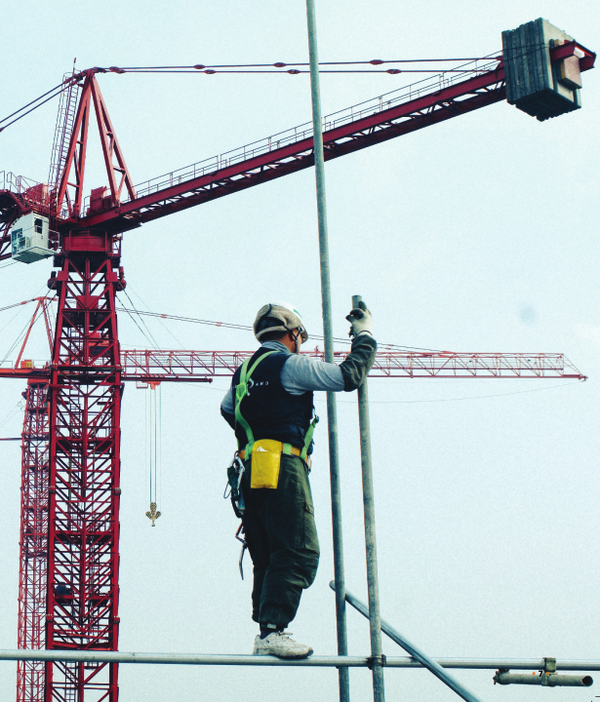
Park Yang-geon Reporter
Kim Ju-myeong Cub-reporter, Song Yu-ra Cub-reporter
There is a lot of controversy about irregular workers in our society. “Irregular workers” refers to workers in various positions, jobs, contract workers, temporary workers and daily employees who are not guaranteed, [1] unlike permanent employees in terms of their working style, duration and persistence[2] of employment. A part-time job that many college students often experience is one of irregular work. According to Statistics Korea in 2018, there are about 6,614,000 irregular workers in South Korea. Recently, irregular workers staged strikes across the country. Strike means people who stop working their jobs to protest, demanding improvement of their working conditions. Let's look at the recent situation and find out more about the current legal and institutional problems.
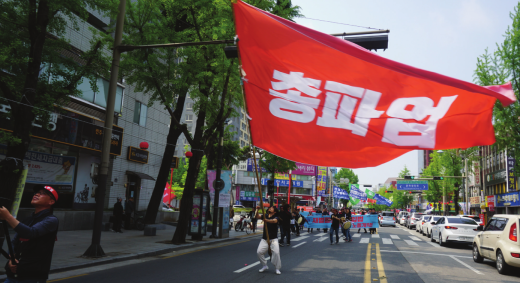
On July third, irregular workers in South Korea staged the strike requesting improvements across the country, including J[3] eollabuk-do. During the strike, the services provided by irregular workers were not available. The street was[4] messed up with lots of garbage and the apartment’s garbage park was not able to dispose the household garbage[5] . Students had to bring lunch from home or go outfor a meal. There was much inconvenience during this strike.[6] So, why did this happen? Why did these irregular workers get so angry and staged strikes? CBNU GLOBE interviewed some individuals who participated in the strike.
Q. Hello. Please introduce yourself. Also, would you tell me what you usually do?
A.
Kim: Hi. I’m Kim Jong-min, the president of the Jeonju branch of the Korean Confederation of Trade Unions. My job is disposing of food waste belonged to Labor Welfare Center.[7]
Son: Hi. I’m – Son Jong-myeong, The chief of organization of KPTU (Korean Public Service and Transport Workers' Union) Education workers solidarity Division. I'm helping people who are being treated unfairly and consulting about their work problems.[8]
Q. Did[9] you join the strike? If you did, would you tell me the reason why?
A.
Kim: Yes, I joined this strike because I wanted to assert my rights and express that my work is valuable. During the strike, many students couldn’t eat school lunch. And many people suffered from the inconvenience because the streets were littered with garbage. [10] The inconvenience imprints on the fact that irregular workers are doing important jobs. Also, this may be the last resort for us to claim our legitimate rights.
Son: Joining the strike created conflicts and social confusion. Nevertheless, we joined the strike because the treatment of irregular workers is getting worse and the government's attitude towards irregular workers is too irresponsible. We also protested to support the current workers as well as the next generation of workers’ environments. We hope our society will get better and better.
Q. When did you feel that you were treated unfairly?
A.
Kim: I think discrimination has always existed. Irregular workers are treated unfairly in recruitment, wages, welfare and working conditions. Sanitary workers (permanent employees) work in a more comfortable place and they have a resting place to rest after work. But, irregular sanitary workers work at harder places and sometimes we work in places where we can't take a break.
Son: When irregular workers have a lot of work to do due to an excessive workload, we feel we are treated unfairly. Unlike permanent employees, there is no concrete and systematic manual for irregular workers. So, when we work at schools, most school principals do not abide by the principle[11] and assigns work to the irregular workers at will. As a result, irregular workers have a lot of work to do and difficulties when they work.
So, why do people constantly demand better treatment of irregular workers? Before we discuss it in earnest, there have been reports of two cases of deaths of two irregular workers in South Korea that resulted in[12] huge social repercussions. The improvement of treatment for irregular workers was discussed before the two accidents. But after the deaths, voices for the improvement have grown and discussions on amending the law have begun.[13]
1. A 19-year-old man who worked on fixing a screen door.
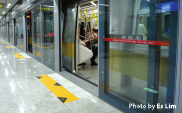
He was a mechanic who repaired subway screen doors. He set off to work after being ordered to repair the Guui station screen door. On May 28, 2016, while fixing the screen door, he was run over and killed by a subway train. He was working by himself, also failed to abide by the rule that there should be two people at the work site.[14]
The main causes of the incident were a shortage of manpower and outsourcing due to budget cuts and a reduction in personnel. Seoul Metro, which operates the No. 2 line, among other, selected the lowest-priced company through the bidding and entrusted the management of Line No. 2 to the outsourced company. Outsourcing firms were forced to give workers low wages and suffered from manpower shortages. At that time, six people had to manage 97 stations. Also, there was a contract clause stating that personnel should be dispatched within one hour after the failure (or subway problem, malfunction) is reported. If he broke the law, he would have had to pay compensation. Thus, the rule that two people should work together was not observed.[15] He did not have enough time to eat, so he frequently ate cup noodles.
2. Kim Yong-gyun, a 24-year-old irregular worker working at the Taean thermal power plant.
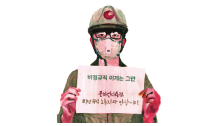
He had checked the conveyor belts carrying the coal, cleaned the spilled coal and reported its condition. On the night of December 10, 2018, while he was checking the conveyor belt, his body was sucked into the conveyor belt and consequently, he died.
He was working alone in a very dark and wide area. At the time of the accident, no one knew that an accident had occurred. The rule that two people should work together was not observed and safety education had not been provided nor conducted. Neither headlamps, nor flashlights were in use at the time. So, he bought a small flashlight at his own expense.
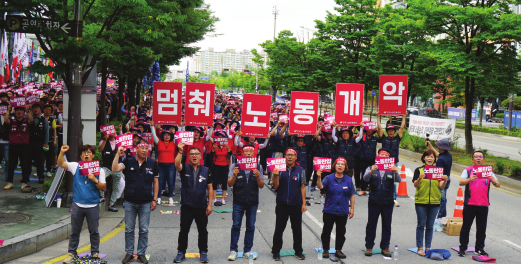
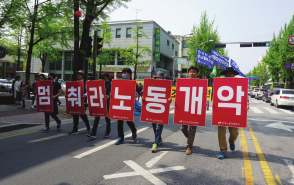
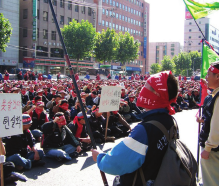
After these two incidents, the public became angry and held many protests. Many politicians, including the president Moon Jae-in, and the Mayor of Seoul, Park Won-soon, expressed condolences and pledged to improve the treatment of irregular workers. The National Assembly accordingly passed an amendment of Occupational Safety and Health Act, which was also called the “Kim Yong-kyun law”.
The amendment included limiting outsourcing of hazardous work, strengthening prevention of industrial accidents, strengthening punishment of business owners who violate safety measures, expanding the scope of workers protected by law and strengthening the responsibilities of business owners.
However, the law contains many loopholes. The biggest problem is that the structure of a subcontractor taking on dangerous tasks has not been resolved. According to the law, subcontractors are prohibited from doing dangerous work such as plating, smelting and processing of several chemicals inside the contracted company[16] . However, only a few chemicals have been set as a criteria[17] for dangerous work. The facility work of power plants, subways and railways, where many deaths occurred, was not recognized as a dangerous work site. Therefore, outsourcing dangerous work was not prohibited.[18]
In addition, the p[19] resident Moon Jae-in pledged to protect the rights of irregular workers through a presidential election pledge, and he took measures to transform irregular workers in the public sector into permanent employees. After his election, he declared an era of zero irregular workers in the public sector. Since July 20, 2017, 184,726 irregular workers working in public sector have been transferred to permanent employees until June 2019.[20]
In addition, President Moon Jae-in, during the election season, made a pledge to protect the rights of irregular workers. As President, he took measures to change the status of irregular workers in the public sector to permanent employees. After taking office, he declared a period of zero irregular workers in the public sector. As a result, between July 20, 2017 and June 2019, 184,726 irregular workers in the public sector were made permanent employees.
However, there are no measures against[21] irregular workers in private enterprises. It was last year's government plan to push for amendments to the law that restrict the use of irregular workers.[22] But again this year, the government has failed to discuss it. In addition, about 20 percent of the changes to permanent employees were not through direct employment but through subsidiaries.
As we have learned, there has been a huge social controversy over irregular workers. It seems as though their treatment and working conditions of these irregular workers has improved. But there are too many limitations and legal loopholes. So, we asked a law expert what legal system should be practically and how to solve the problem[23] .
Nam Woo-geun, A certified labor attorney at Korean Contingent Workers' Center
Nam: Irregular worker can be protected from discrimination by part time worker and dispatched worker protection law. However, these laws can’t be applied effective and have difficulty practicing in real life. Requesting discrimination remedy to court, it takes 3~5-year to complete the judge. This procedure is burden enough for irregular workers, so that they can't devote to their work and feel hard to apply for another job. Therefore, we ask to give the right of discrimination remedy not only to worker, but also to labor union.
Irregular workers may be protected against discrimination under the part-time worker and dispatched worker protection law. However, these laws can’t be applied effectively and are rarely applied in real situations. Requesting remedies for discrimination in court could take three to five years to receive a decision from a judge. This procedure (course of action) is a burden to irregular workers because they must continue working and seek alternative employment elsewhere. Therefore, another option for receiving remedies for possible disrimination would be from the labor union, aside from the courts.
Generally, business owners must apply occupational health and safety insurance letting their employee secured. Although there is a clause[24] , if irregular workers have an accident, it is hard to be regarded as an industrial accident and can’t be compensated by their employer. Some employers even cancel contract when their employee gets hurts by industrial accident. In the case of disease, it is hard to prove the causality that worker got disease in working place. To make it easy, we require lower standard allowing workers’ accidents as industrial accidents and to strength penalty and supervise system so that employer can’t cover up industrial accidents.
Generally, business owners must apply for occupational health and safety insurance for each of their employees. (Though there is a clause that says) Although, if an irregular worker has an accident, it is hard to prove that it was an industrial accident, which would be covered under the occupational health insurance, therefore, not compensated by the employer. Some employers tend to cancel contracts when their employees get hurt on the job. In the case of illness, this is hard to prove the cause of the disease, whether it was work-related or not. To make it easier for these employees, we should require lower standards allowing work-related accidents to be covered as industrial accidents, as well as strengthening the penalty for employers who try to cover up industrial accidents, to deter them from doing so.
In school, there is no systematic system so many irregular workers have a lot of work to do. They cannot participate in a school affair. In addition, the division of labor is carried out by discretion of school principle. Therefore, equal work sharing can’t be carried out, which leaves irregular workers additional work, even not their own. In case of Jeollabuk-do, about 7,000 people are employed as an irregular worker. Especially, 40 percent of workers in school are irregular worker.[25] To solve the problem related with education, the Education Ministry should set up a system of positions by job and create a wage system.
At educational institutions, there is no regulated system as far as required duties for irregular workers. This allows employers to give much work to the irregular worker, who then cannot participate in other school affairs. Additionally, the division of work is carried out at the discretion of the school principal. This results in unequal work between regular and irregular workers, pushing work on the irregular worker that they should not be doing.
In Jeollabuk-do, there are approximately 7,000 people are employed as irregular workers. In particular, 40 percent of these are working in schools. To solve this problem related to education, the Education Ministry should set up a system of positions by job and duties, and create a wage system, to be used within the private sector. [26]
Son: It is irrational that irregular workers are discriminated against regular workers while doing the same thing. irregular workers are around us and you may also be working as irregular worker. Resisting unjust treatment and asserting one's rights is the way to change our society for the better than now. Pay more attention to this reality and correct the wrong. Then our society will become brighter.
It is irrational that irregular workers are discriminated against, while regular workers do the same jobs and are treated much better, with more dignity. Irregular workers are all around us, people you know may be an irregular worker. Resisting unjust treatment and asserting one’s legal rights is the way to change our society now, for the better, for the future. If we pay more attention to this unfair, unjust reality and correct the wrong, then our society will become more harmonious and brighter.
what do you mean by not guaranteed?
persistence? As unsecured workers, they are persistent in seeking a job, or keeping the job they have even though it's insecure?
How about consistence, or continuance of employment?
Jeollabuk-do is the NAME of a province, region in Korea. It is considered a PROPER NOUN, so the first letter should be capitalized.
Which street? In Seoul? Where was this street that was messed up?
If it was all over Korea that these irregular workers were striking, then probably it was more than one street. If street is plural, make it plural and make the verb agree with it (streets were).
One major case in point, during the days of the strike, the streets were littered with piles of garbage scattered around numerous apartment buildings, around the country. Household garbage from apartment buildings, short-rise buildings and homes was not collected because the workers were on strike. (Garbage is a non-count noun, so agrees with a third person singular verb).
From the end of "Students had to bring...." to "So, why did this happen?" there is not much flow. In this case, it's good to add a connecting sentence so readers follow your thoughts from the effects of the strike to the cause of the strike. Do you understand this?
I realize this is from an interview, so will try to keep it as close to the original translation as possible.
My job with the Labor Welfare Center involves the disposing of food waste.
I head the Korean Public Service and Transport Workers' Union (KPTU) and work in the Division for the Education for Workers' Solidarity. I help people who are being treated unfairly and need consultation relating to their work problems.
A Union = an organization, so it's not necessary to use organization when you also have 'union'.
You are asking about something that happened recently, in the past. Therefore, answers should also use past tense. Right?
You have two sentences with very different ideas. The first talks about students not eating school lunch.
The second sentence talks about the inconvenience of littered streets. They are very valid and good, but they don't flow. Again, this is translated so I am trying to use original words, though, also trying to get the ideas that they wanted to share.
During the strike, many students couldn't eat school lunch. Elsewhere (in other parts of society), many people suffered from the inconvenience of the streets littered with garbage. These inconveniences became the silent voice of the irregular workers to show that the work they do is important. Also, this strike may be the last resort for us to act on our legitimate rights.
Do you mean, don't follow the rules and regulations?
So, when we work at schools, most school principals do not abide by the rules and regulations and assign irregular workers additional, unexpected tasks at liberty, without much consideration to the actual jobs the irregular workers are contracted to do.
resulted in or contributed huge social repercussions.
The improvement of work conditions for irregular workers was discussed before these two accidents. However, after their deaths, the cry for changes for these irregular workers has grown and discussions on amending laws on work conditions have been revived.
He was working alone, which was a failure to abide by the rule that there should be two people at the work site.
How do you come to the conclusion about 'the rule that two people should work together was not observed'?
If he had waited for dispatch to provide another work, he might not have been killed because he would not have been alone? I don't see the connection clearly.
on the premises of the contracted company.
criterion is singular and criteria is the plural form. In this case, I believe the plural form should be utilized. What do you think?
In the past, irregular workers working in power plants, subway and railway facilities, where many deaths occurred, were not deemed dangerous work sites.Therefore, outsourcing dangerous work was not prohibited.
Moon Jae-in is the President of Korea. This is a title, considered a proper noun.
If it were just a regular word, used in a sentence like:
Generally, a president aims to protect the rights of irregular workers.
then, president would not be capitalized, because it is a general reference to the presidency as a position, not a person. Do you understand this?
So what happens to these irregular workers after June 19? Do they again become irregular workers and go back to the working conditions they had before?
Did I misunderstand what you wrote? I understood that the worker's status as irregular employees was just for a two year period from July 2017- June 2019. Is this right? Or did you mean that by June 2019, most irregular workers would be converted to permanent employees in the public sector?
Sorry, it was a little confusing.
What does this mean?
Private enterprise can use irregular workers unlimited? It's common in private enterprise to have irregular workers?
In 2018, the government's plan was to push for amendments to the law that would restrict the use of irregular workers in private entities. However, two years in row, the government has failed to bring this issue for discussion.
Additionally, from the workers mentioned earlier, who were changed from irregular workers in the public sector to regular employees, 20 percent of them were not through direct employment, rather through subsidiaries.
So we asked a legal expert what practical changes would help to solve the problem.
Where is this clause found? Is it part of the occupational health insurance?
This information came from the legal adviser you spoke to? If not, it would be good to say where the numbers were sourced from.
I added this to remind the readers we are talking about private sector irregular workers.
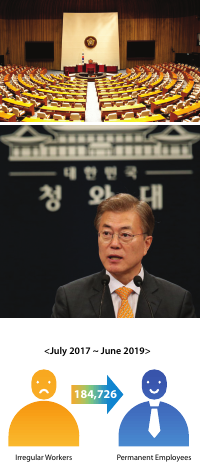
This sounds like a good idea!

